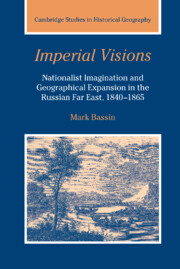 Imperial Visions
Imperial Visions Published online by Cambridge University Press: 06 July 2009
“What cannot be held had better be ceded”
The belief that Russian navigation on the Amur river was vital for the logistic support of settlements in the North Pacific was an old one, going back well into the eighteenth century. It was a perspective that Murav'ev at first strongly endorsed, and upon assuming office he used this rationale to press the importance of the river. In a memorandum to the tsar on the eve of the Crimean War, however, we have seen how the governor-general gave the first indication of a reorientation in his own thinking about Russia's position in the Far East. In its North American territories, he suggested, Russia was faced with what was essentially a hopeless situation. Despite all efforts to maintain Russian authority and control in these remote regions, it would ultimately prove impossible to resist the expansive pressures of a dynamic American empire which sought almost intuitively to occupy and incorporate them. American dominion over the entirety of North America was simply inevitable, and thus Russia was left with no choice but to relinquish its Alaskan territories as gracefully and as profitably for its own interests as possible. Murav'ev sought to mitigate the shock of this point, however, with the argument that the forfeiture of Russian North American did not in any any way signal an imperial retreat from the Far East.
To save this book to your Kindle, first ensure [email protected] is added to your Approved Personal Document E-mail List under your Personal Document Settings on the Manage Your Content and Devices page of your Amazon account. Then enter the ‘name’ part of your Kindle email address below. Find out more about saving to your Kindle.
Note you can select to save to either the @free.kindle.com or @kindle.com variations. ‘@free.kindle.com’ emails are free but can only be saved to your device when it is connected to wi-fi. ‘@kindle.com’ emails can be delivered even when you are not connected to wi-fi, but note that service fees apply.
Find out more about the Kindle Personal Document Service.
To save content items to your account, please confirm that you agree to abide by our usage policies. If this is the first time you use this feature, you will be asked to authorise Cambridge Core to connect with your account. Find out more about saving content to Dropbox.
To save content items to your account, please confirm that you agree to abide by our usage policies. If this is the first time you use this feature, you will be asked to authorise Cambridge Core to connect with your account. Find out more about saving content to Google Drive.